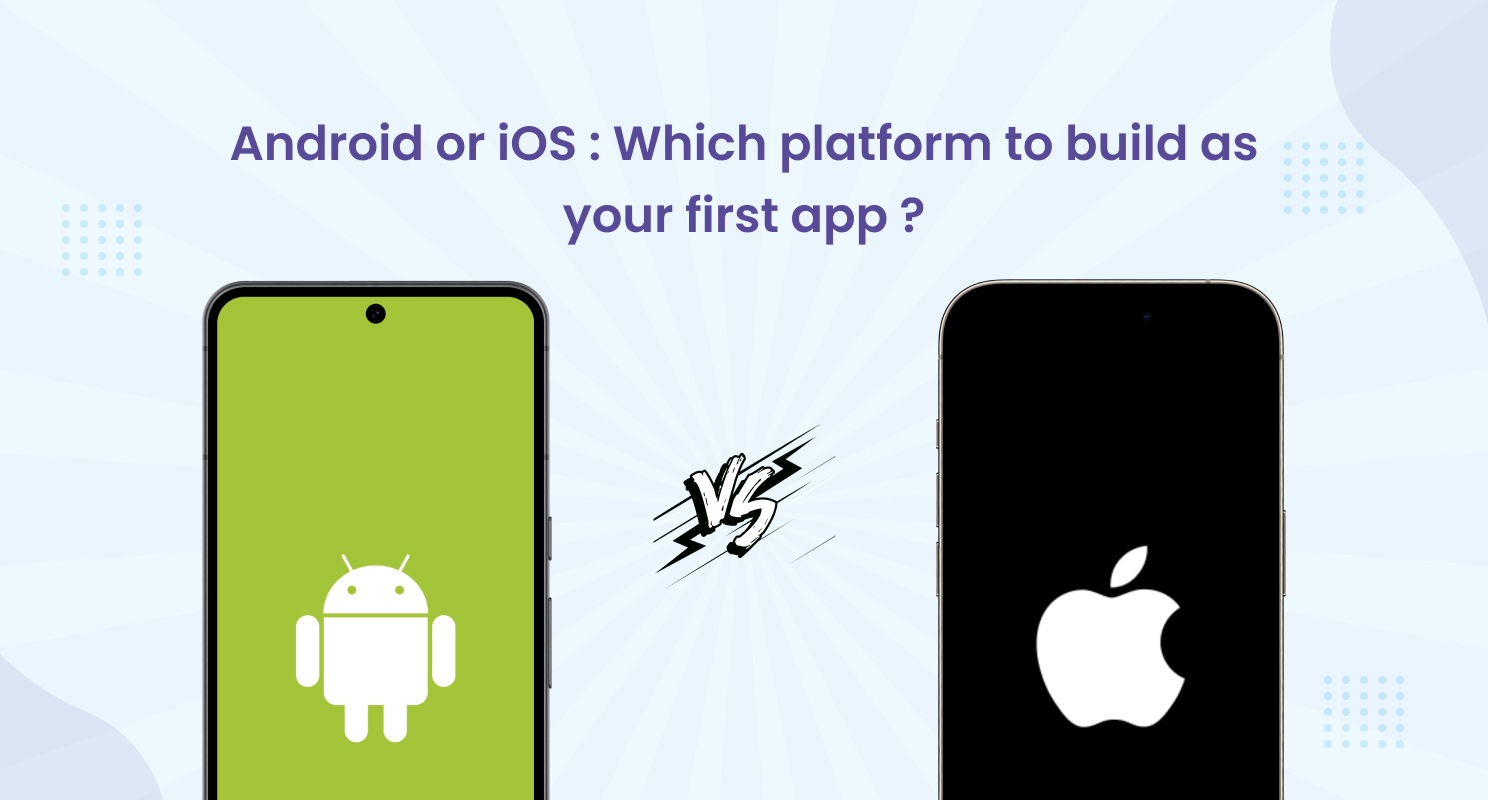8 April 2024
Published by

In the ever-evolving landscape of mobile app development, choosing the right platform for your first app is a critical decision. As of 2024, the competition between Android and iOS remains fierce, each offering unique advantages and challenges. Let’s delve into the considerations that can guide your decision-making process.
With billions of smartphone users worldwide, the market of mobile app development has experienced unusual growth, and developing an app has become an alluring endeavour. However, the pivotal question remains: Android or iOS?
To make an informed decision, understanding the market dynamics is crucial. Both platforms boast immense popularity, but their ecosystems differ significantly. Whether you’re an experienced developer or a newcomer , choosing the right platform sets the tone for your app’s success.
The platform you choose can influence your app’s reach, user engagement, and revenue potential. Factors such as market share, user demographics, and development tools play a pivotal role in shaping your app’s destiny.
Android, backed by Google, commands a substantial market share globally. Its open-source nature allows for extensive customization, making it a preferred choice for developers aiming to push the boundaries of creativity.
Android’s widespread adoption is evident in its dominant market share, capturing the majority of the smartphone market. The diverse user base presents a vast audience for app developers to target.
The flexibility offered by the open-source nature of Android allows developers to tailor their apps to specific requirements. Customization options are abundant, enabling developers to create unique and feature-rich applications.
In contrast, iOS, the operating system developed by Apple, has a reputation for delivering a seamless user experience within its closed ecosystem.
iOS users are often associated with higher spending power, making it an attractive platform for developers seeking to monetize their apps. The closed ecosystem ensures a consistent and controlled environment.
Apple’s stringent App Store guidelines emphasize quality and security. The development process, centered around Xcode and the Swift programming language, enforces high standards, resulting in a refined app experience.
Understanding your target audience and their preferences is crucial. Android may dominate certain regions, while iOS might be prevalent in others. Consider the demographics and market trends to make an informed decision.
The cost and time involved in app development can vary between platforms. Android’s open nature may lead to a wider range of devices to cater to, potentially extending development timelines.
Monetizing your app is a significant aspect of development. Analyze the monetization models supported by each platform and choose the one aligning with your goals, whether it’s through in-app purchases, ads, or subscriptions.
Android development predominantly relies on Android Studio and an array of development tools.
Android Studio offers a comprehensive set of tools, including an emulator for testing apps across various devices. Familiarizing yourself with these tools is essential for a smooth development process.
Android’s fragmentation, with various devices running different versions of the operating system, can pose challenges. However, staying updated on best practices and using adaptive design principles can mitigate compatibility issues.
Developing for iOS involves working within Apple’s carefully curated ecosystem.
Xcode, Apple’s integrated development environment, coupled with the Swift programming language, ensures a streamlined and efficient development process. Mastery of these tools is advantageous for creating high-quality iOS apps.
The closed nature of iOS can present challenges in terms of customization. However, understanding and adhering to Apple’s guidelines is crucial for gaining approval on the App Store.
Ensuring a seamless and enjoyable user experience is paramount for app success.
Android’s design principles focus on flexibility and adaptability. Tailor your app’s design to accommodate various screen sizes and resolutions for a cohesive user experience.
iOS emphasizes a consistent and intuitive user interface. Adhering to Apple’s Human Interface Guidelines ensures that your app aligns with iOS design standards, contributing to a positive user experience.
Security is a top priority for both platforms, but their approaches differ.
Android incorporates robust security features, including app sandboxing and regular security updates. Developers should stay vigilant to potential vulnerabilities and adopt best practices in coding to enhance app security.
iOS takes a proactive approach to security with stringent App Store guidelines and a closed ecosystem. The approval process ensures that only secure and trustworthy apps make it to the App Store. Adhering to Apple’s guidelines is crucial for safeguarding user data and maintaining user trust.
Thorough testing is indispensable for delivering a polished and bug-free app.
Given the diverse range of Android devices, comprehensive testing is vital to ensure compatibility. Utilize emulators and real devices to simulate various user scenarios. Pay attention to different screen sizes, resolutions, and operating system versions to identify and rectify potential issues.
Xcode provides powerful debugging tools to identify and resolve issues efficiently. The integrated debugger allows developers to step through code, inspect variables, and pinpoint the root cause of bugs. Familiarity with these tools is essential for streamlining the debugging process
Choosing between Android and iOS for your first app in 2024 ultimately depends on your target audience, development preferences, and monetization strategy. Android offers a broader reach and flexibility, while iOS provides a more controlled environment with higher revenue potential. Consider your goals and resources carefully to make the right choice for your app development journey.